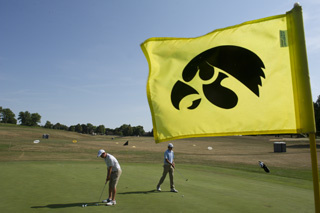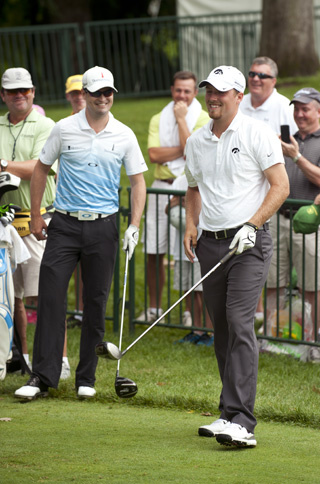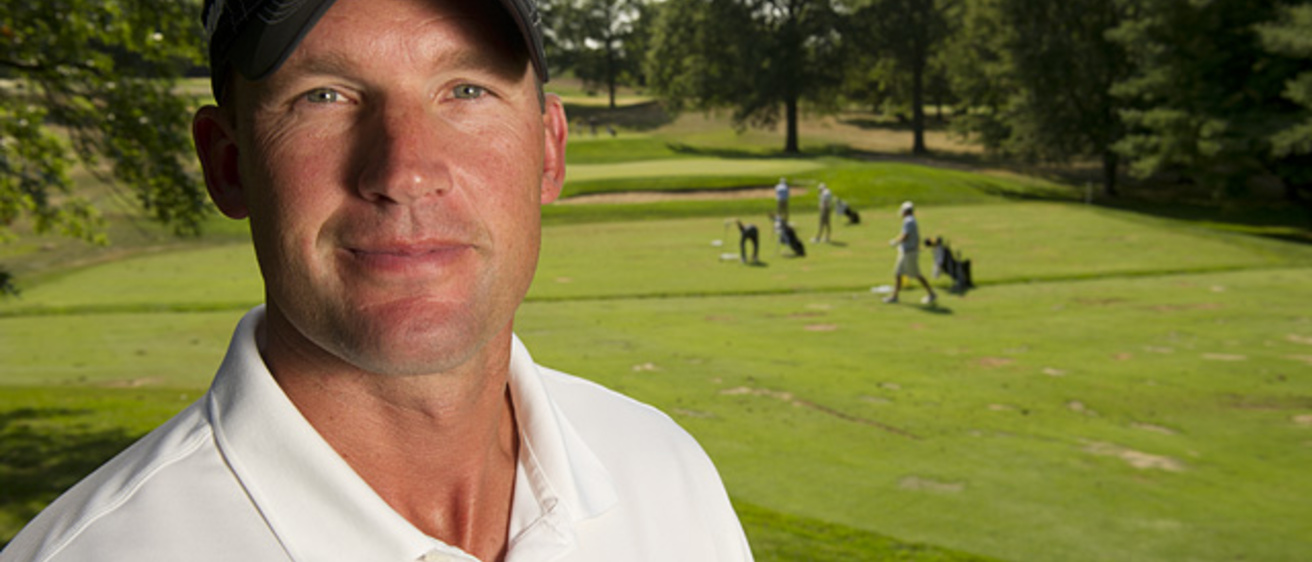When Mark Hankins was hired as the head men’s golf coach at the University of Iowa in 2008, the program was ranked 155th in the nation. It didn’t take Hankins long to elevate the program into a national presence.
In just his second season as head coach at Iowa, the Hawkeyes qualified for the NCAA Finals and finished 17th in the country. Since 2009, Iowa has finished ranked as high as 10th in the country, advanced to NCAA competition in each of the last five seasons, and won nine tournament titles.
Hankins has coached three All-Americans, eight All-Big Ten selections, one Big Ten Player of the Year, five Academic All-Americans, and 17 All-Big Ten honorees in his Iowa career.
The Mount Pleasant, Iowa, native recently sat down with Iowa Now to talk about Iowa’s quick rise to the national scene in collegiate golf, his approach to coaching the physical and mental side of the game, and tips for average golfers to improve their scoring.
Be sure to check out Hankins and the Iowa golf team Sept. 15-17 at the Golfweek Conference Challenge at Spirit Hollow Golf Course in Burlington, Iowa. Click here for more information on the event.
Before coming to Iowa, you enjoyed a tremendous amount of success as head coach at Michigan State (two Big Ten championships and two-time Big Ten Coach of the Year). What made you decide to take the job in Iowa City?
One of my career goals was always to coach at the University of Iowa. When the job came open, I just happened to be in a really good position. We had just won a Big Ten championship at Michigan State and Iowa had finished last by a substantial margin, and I felt like I could help. I’m proud of the state of Iowa, Iowa City is a great place, and the University of Iowa is special. I’m glad I was able to fulfill one of my golf coaching goals.
What makes Iowa City and the UI a special place to live and work?
This is one of the greatest college towns in the country. It’s a smaller Big Ten school, which gives it the quaint, hometown feeling and atmosphere. But, we have a large athletic department with huge football and basketball stadiums that gives our campus the “big-time” feel. We are situated in a place that isn’t over-populated; it’s extremely convenient to get around town and access our multiple facilities on and off campus.
People talk about Iowa not having a professional sports team all the time, but I think it makes a difference. The UI is a focus in the state. Our team has been successful over the past few years, and we have gained a lot of accolades across the state. People pay attention to our university, and we have seen that with our success. That makes this place special.
"This is one of the greatest college towns in the country. It’s a smaller Big Ten school, which gives it the quaint, hometown feeling and atmosphere. But, we have a large athletic department with huge football and basketball stadiums that gives our campus the 'big-time' feel. We are situated in a place that isn’t over-populated; it’s extremely convenient to get around town and access our multiple facilities on and off campus."
—UI men's golf coach Mark Hankins
It only took you one season to make Iowa golf a household name in collegiate golf. How did that happen so quickly?
There was a lot of time spent on the little things in that first year. I had to change the culture in the program and that meant changing practice schedules, recruiting strategies, and competition schedule. The team had to be pushed to win championships. I was fortunate enough to win Big Ten titles at Michigan State, and I wasn’t guessing on how to do it at Iowa. I had a blueprint of what needed to be done and those actions began immediately.
Another factor in the quick turnaround was having athletic, intelligent younger players and a great senior leader in Cole Peevler. The younger guys followed his competitiveness and bought into my program, and everything clicked when it came to the postseason.
Many coaches mention changing culture when it comes to turning a collegiate athletic program around. What all goes into changing a culture in athletics?
Accountability is one of the biggest pieces. If we start practice at 6:29 a.m. that means 6:30 is late. I held our athletes accountable to every rule that was put in place, and they thrived within the discipline and direction that I pointed them in.
The other part, at least in golf, is setting a schedule that is strong enough so our team could be pushed, but still be competitive. From there, we needed to create two solid golf tournaments at home that would improve our national ranking and give us an advantage by playing on our home courses. All of those things, combined with spending a lot of personal time with the athletes to address their individual needs and weaknesses on the golf course and at the UI.
The Golfweek Conference Challenge is one of those tournaments you began hosting right away. That tournament now has a reputation as one of the best collegiate events in the nation. How important has that been to your program?
Nationally, it really means a lot. We host the tournament at Spirit Hollow in Burlington and appreciate the support from Randy Winegard and everyone associated with the event. The partnership with Golfweek gives the tournament instant credibility and coverage on a national scale. It also gives us the opportunity to host a top-level field. In college golf, your ranking is based on the teams you beat, or finish ahead of, in each tournament. For us to have the chance to take on a nationally ranked field at a course we are familiar with is a definite advantage.
What has it taken to keep Iowa golf in the national spotlight since your first appearance in the NCAA Finals in 2009?
You’ve got to maintain a top-notch schedule, you have to recruit the absolute best player in the state of Iowa and the best player from surrounding states, and you’ve got to provide facilities that are available to players that want to work hard. That means having a place that allows our players to have flexibility with class and practice schedules, coming in early in the morning or late at night to work on their games.
From there, it’s a matter of competing round-by-round in those tough tournaments. The things I mentioned earlier help get us to that level, and we have been fortunate enough to compete at a high level. That’s the advantage of playing against the best in the country; kids strive to get to that level if you confront them with it.

The new Hoak Family Golf Facility gives your student-athletes a great area to work on their games.
We constructed a facility that gives us what we need to stay competitive on a national level. It’s not the biggest facility
in the nation, it’s not the shiniest, but it’s extremely functional and first class in every way. It allows our players to have flexibility in practice times around their class schedules. They can study at the facility and practice during study breaks. Bottom line is our student-athletes now have the tools to out-work anyone else in the country. It’s up to them to put in the time and work within our system to compete for championships.
The casual golf fan might not understand the physical demands of college golf. How does your practice routine reflect your views of being in great physical shape in order to be a good collegiate golfer?
Most of the articles written about workouts and golf talk about strength and flexibility. While that’s important, that is a small part of collegiate golf. Being able to walk 36 holes, carry your own bag, and play great golf the entire day at our tournaments, then wake up at 5:30 a.m. and do it all over again the next day is a physical test. You’ve got to have a fitness element in your routine in order to stay physically sound during a round in order to execute golf shots. If you are physically tired, your mental game will drag. That’s when golfers start to struggle. If our guys are in great physical shape, they have the tools to be successful.

These kids don’t need to hit the ball further. Steven Ihm witnessed it this summer at the John Deere Classic playing with PGA TOUR professionals. He was driving it 20 yards past tour pros everyday. It’s not about gaining strength anymore, it’s about being in shape so your body does the work and you can focus on your game.
How do you preach the mental side of the game to your student-athletes?
Every Wednesday we have a one-hour session. We present a skill and talk about how to apply that skill to competition. If you have the discipline to practice and apply these mental skills, then you can be a mentally tough competitor. The guys need to look at themselves and ask questions: How did I warm up today? How did I prepare for my round with a game plan? How did I perform during the round? How do I warm down after? How do I look at my round from a statistical view, and how do I evaluate those stats?
All of those skills, along with confidence instilled from practice and competition, go into mental toughness. Everyone absorbs mental skills at a different rate and it takes practice. Rehearsing those mental skills is just as important as going to the range and hitting balls for an hour.
You were a standout athlete in multiple sports in high school and are still very active today. How did your background help mold your coaching style and philosophy?
For me, it’s all about competition. If you want success, you want to be the best player on your team. Secondly, you need to be confident enough to know you belong on a national level. I try to exude that mentality to my players everyday. We cannot be complacent or lackadaisical in any aspect of our approach. There is a difference between a high level of preparation and a championship level of preparation.
I have always been a competitive person and gravitated towards athletics at a young age. I think that competitiveness has helped me in coaching throughout my career.
"For me, it’s all about competition. If you want success, you want to be the best player on your team. Secondly, you need to be confident enough to know you belong on a national level. I try to exude that mentality to my players everyday. We cannot be complacent or lackadaisical in any aspect of our approach. There is a difference between a high level of preparation and a championship level of preparation."
—UI men's golf coach Mark Hankins
What are a few tips for the average, weekend golfer to shave a few strokes off their scores?
If you want to take some strokes off your game, it needs to come with a club that attacks the hole on a regular basis. That means your wedges and chipping or your putter.
Three-putting is one of the biggest things I see with the average golfer. If you want to improve your game, go out to the course you play and take advantage of a free putting green to work on it. It doesn’t cost a dime to go out and roll putts if you have some free time.
Next to putting, the hardest thing to do for the average golfer is chipping because so much technique is involved. So many people waste shots from 20 yards and in. Ball striking comes and goes, but a consistent short game is where you can eliminate strokes. Instead of going to the range and hitting drivers and long irons for an hour, go to the putting greens to chip and roll putts.
